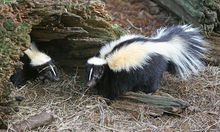On August 30, 2016, a new Rabies case was confirmed in Brevard County, Florida. The adult mare had no previous vaccine history and had not been off the premises in over a year. Clinical signs began on August 26 and the horse was euthanized for humane reasons the same day. This is the first confirmed Rabies case in Brevard County and the second confirmed case in Florida for 2016.

Skunks, carriers of rabies virus fatal to humans and horses
World Rabies Day is held on September 28, the anniversary of the death of Louis Pasteur who, with his colleagues, developed the first efficacious rabies vaccine.
© 2016 by Tom Friedel
This case of rabies should remind horse owners of the upcoming World Rabies Day which was started in 2007 to create a global opportunity for people to focus on rabies prevention. Since then, it has grown year after year, with hundreds of thousands of people participating in events on or around September 28, and at other times of year too.
September 28 is the anniversary of the death of Louis Pasteur who, with the collaboration of his colleagues, developed the first efficacious rabies vaccine. The United Nations Observance is coordinated by the Global Alliance for Rabies Control, a non-profit organization with headquarters in the United States and the United Kingdom.
World Rabies Day aims to raise awareness about the impact of rabies on humans and animals, provide information and advice on how to prevent the disease, and how individuals and organizations can help eliminate the main global sources.
Events held to mark World Rabies Day range from symposia on current rabies control methods and public events for raising awareness about good prevention practice, to sponsored walks, runs or bike rides, to free or externally-subsidized vaccination clinics for dogs.
Rabies is a viral disease that causes acute encephalitis (inflammation of the brain) in warm-blooded animals. The disease is zoonotic, meaning it can be transmitted from one species to another, such as from dogs to humans, commonly by a bite from an infected animal.
Horses typically suffer from a paralytic form of rabies instead of the "mad" form exhibited by dogs and other animals which contract the disease.
In most areas of the USA, bites from skunks are the primary way horses contract rabies, but in New England and throughout the southeastern states, rabid foxes and bats are also known to infect horses.
For humans, horses, and other animals, rabies is almost invariably fatal if post exposure prophylaxis is not administered prior to the onset of severe symptoms. The rabies virus infects the central nervous system, ultimately causing disease in the brain and death.
